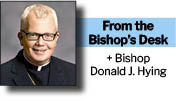
Last weekend we finished the Easter season with the celebration of Pentecost, the pouring forth of the Holy Spirit upon the disciples gathered with the holy women and the Blessed Virgin in the Upper Room.
This infusion of grace transformed the first followers of Jesus into holy, bold, effective, and sacrificial witnesses to the Resurrection and the power of the Gospel.
Ever since the birth of the Church that day, we have lived in the age of the Holy Spirit, for we too have received the fullness of that divine power in the Sacraments of Baptism and Confirmation.
We too are sent on a mission by the force of the Spirit.
Knowing the Holy Spirit
In the Western Church, we often pay scant attention to the Holy Spirit.
We pray to the Father, and we can know Jesus in the Scriptures, but the Third Person of the Blessed Trinity often remains unknown to us and we seldom call on His mighty power.
In John’s Gospel, Jesus speaks of the need for Him to leave, so that He can send the Paraclete who will guide us into all truth and remain with us always. (John 16:7)
The word “Paraclete” comes from ancient Greek and means “called alongside” or “called in aid.”
The Holy Spirit is the Sanctifier who breathes the grace of God upon us, enabling us to acknowledge the Lordship of Jesus, to believe the Gospel, to reconcile and forgive, and to evangelize others in the faith.
In the Scriptures, the Holy Spirit breathes on the waters at the moment of creation, anoints the prophets of the Old Testament, overshadows Mary at the Annunciation, descends on Jesus at His Baptism, and gives birth to the Church on Pentecost.
In every sacrament, the Holy Spirit, invoked in the epiclesis at Mass, the rite of absolution in Confession, and the prayer over the ordinandi at an ordination, is the One who makes the sacrament actual and efficacious.
The Holy Spirit is to the Church what the soul is to the body, the animating life within.
Beginning with paragraph 687, the Catechism of the Catholic Church profoundly explicates the identity and mission of the Holy Spirit.
“The mission of Christ and the Holy Spirit is brought to completion in the Church, which is the Body of Christ and the Temple of the Holy Spirit. This joint mission henceforth brings Christ’s faithful to share in his communion with the Father and the Holy Spirit. The Spirit prepares men and goes out to them with His grace, in order to draw them to Christ. The Spirit manifests the risen Lord to them, recalls His words to them and opens their minds to the understanding of His death and resurrection. He makes present the mystery of Christ, supremely in the Eucharist, in order to reconcile them, to bring them into communion with God, that they ‘bear much fruit.’ (no. 737) Thus the Church’s mission is not an addition to that of Christ and the Holy Spirit, but is its sacrament: in her whole being and in all her members, the Church is sent to announce, bear witness, make present, and spread the mystery of the communion of the Holy Trinity.” (no. 738)
We need to understand these two paragraphs with deep interior clarity and to proclaim them from the housetops!
The goal of the entire saving mission of Christ is to draw every single person into a growing and perpetual union with the Holy Trinity through the efficacious work of the Holy Spirit in the communion of the Church.
Often, people will say to me that they do not need to go to church in order to be a good person.
This statement reduces our religious practice to ethics, to say that our faith is simply about doing good things or being a kind person.
I can certainly be kind without believing in Christ, but I cannot be in full and saving communion with God without the Church and her sacraments.
All about relationship
The Solemnity of the Most Holy Trinity this Sunday reminds us that our religion is ultimately about relationship, as we ponder the interior relational nature of God Himself, completely One in His Essence, and Trinitarian in Three Persons.
As Americans, we like to get things done, to be busy, and to accomplish great deeds.
Heroic actions of service, catechesis, volunteerism, mission work, and charity are essential parts of being a disciple of the Lord, but they find their efficacy and meaning only in a life of prayer, sacrament, and study of the Scriptures, all of which increase the sanctifying grace within our souls, the indwelling of God Himself.
Call on the Holy Spirit daily. Ask Him to console, strengthen, inspire, and inflame you with Heavenly gifts. Nourish the presence and action of the Holy Trinity within you through regular reception of the Eucharist and Confession, daily meditations on the Bible, and a life of prayer.
We are absorbed and busy with many things, like Martha, but like Mary, the Lord takes great delight in us when we simply sit at His feet and listen to the voice of the beloved Master.
The Holy Spirit is both powerful and gentle, forceful and quiet, working in each soul as He sees fit, both for our personal salvation and the redemption of the world.

